|
|
|
Sort Order |
|
|
|
Items / Page
|
|
|
|
|
|
|
| Srl | Item |
| 1 |
ID:
162468
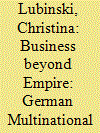

|
|
|
|
|
| Summary/Abstract |
The activities of multinationals in India have so far been described as a British–Indian story. However, the British Empire was never an impenetrable economic area, but, rather, a contact zone for firms of many different origins. This article diversifies the historiography of Indian business history by tracing the commercial interactions between Germany and India from the 1890s to the 1960s as one example of non-British multinationals. It shows continuities in actors, debates and strategies and across major political turning points. In particular, it highlights the alignment of aspirations between Germans and nationalistic Indians as a coalition against British dominance.
|
|
|
|
|
|
|
|
|
|
|
|
|
|
|
|
| 2 |
ID:
162467
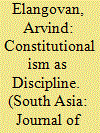

|
|
|
|
|
| Summary/Abstract |
Ironically, despite being acclaimed as one of the foremost biographers of the Indian Constitution, little is known about Benegal Shiva Rao (1891–1975) or his ideas about constitutionalism. By delving into Rao's published writings and his incomplete, unpublished autobiography, this essay reconstructs his idea of constitutionalism as one that primarily sought to discipline politics. However, I argue that such a view also leads to erasing the accounts of political conflict that comprise the history of the Indian Constitution. By analytically bringing together this curious triadic relationship between politics, constitutionalism and history, this essay explores how an isolated focus on constitutionalism leads to troubling historical amnesia.
|
|
|
|
|
|
|
|
|
|
|
|
|
|
|
|
| 3 |
ID:
162460
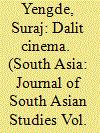

|
|
|
|
|
| Summary/Abstract |
This article offers introductory remarks on the position of the Dalit in Indian cinema. It starts with the observation that the Indian film industry is an inherently caste-based, biased, mechanised product of technological industrialisation in which Dalit inclusion is not a moral concern. The mainstream film industry in India delivers the desires and principles of market and society by excluding a Dalit framework outright—a problem now being addressed by the entry of an explicitly Dalit cinema. By briefly looking at two films, Fandry (2013) and Sairat (2016), both written and directed by Dalit film-maker Nagraj Manjule, I offer a critical reading of ‘Dalit Cinema’. Taking the work of Manjule, a maverick film-maker who is establishing a new discourse of Dalit-centred socio-culturism, I demonstrate the extent to which caste narratives are absent in the Indian film industry.
|
|
|
|
|
|
|
|
|
|
|
|
|
|
|
|
| 4 |
ID:
162466
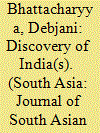

|
|
|
|
|
| Summary/Abstract |
The four essays in this special issue focus their attention on excavating particular strands within Indian historiography that look askance at the existing schools of thought be they nationalist, Marxist, or subaltern. However, this is not a project of recovering the forgotten or arranging these events into a long shelf of fragments that disrupt the unified history of the nation-state; rather it is a project of discovering various moments that went into the making of India-projects that were elite but forgotten; projects that were for the forgotten peoples of India, but ironically remembered only by a handful elites, projects that speak of the European, but not the colonial, entanglements in the making of the thirties and forties and, finally, these projects unearth some of the conservative energies and impetus locked within our master- and counter-narratives of state-formation, liberalism, nationalism and democratic republic. The essays return to the biography of the nation, to resist not simply its homogenising impulses, but to ask critical questions about acts of remembering, commemorating and excising that go into the narration of the nation's biography.
|
|
|
|
|
|
|
|
|
|
|
|
|
|
|
|
| 5 |
ID:
162469
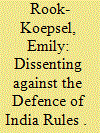

|
|
|
|
|
| Summary/Abstract |
Indian democracy has been plagued by a long history of ‘rules’ and ‘acts’, defined broadly as assigning to the state the power to impose order, but without clear guidelines as to their use. Understanding agitations against these rules and acts is helpful in seeing a line of challenge to state authority from the position of democracy. This paper will describe the agitations by the All India Newspaper Editors’ Conference (AINEC) against Article 41 of the Defence of India Rules (1939), which focused on the government's ability to censor, ban and fine newspapers. AINEC's fight made visible the effect of capricious and unpredictable government actions on actors outside the elite. In addition, the shifts in censorship brought about by the Defence of India Rules highlighted how groups, ideas or writing could shift from being regarded as ‘responsible’ and credible to ‘irresponsible’ and dangerous on the basis of state decisions.
|
|
|
|
|
|
|
|
|
|
|
|
|
|
|
|
| 6 |
ID:
162470
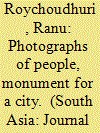

|
|
|
|
|
| Summary/Abstract |
In the late 1970s, a photo-documentation project titled ‘People of Calcutta’ aimed at bringing about positive social change through imaging the everyday lives of ordinary Calcuttans. These photographs responded to a post-colonial situation and created a ‘counter-narrative’ of the agency of the urban poor. Weaving together photographs and their intellectual history, this paper charts the ways in which this visual documentation invested deeply in human development while providing a ‘positive image’ of the urban poor.
|
|
|
|
|
|
|
|
|
|
|
|
|
|
|
|
| 7 |
ID:
162463
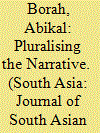

|
|
|
|
|
| Summary/Abstract |
The term ‘vernacular modernism’ came into being amidst proliferating conceptual frameworks to explain the diverse paradigms of modernity as a global process. More specifically, ‘vernacular modernism’ as a category of analysis emerged in an effort to democratise the term ‘modern’ with respect to non-metropolitan cultural formations. However, this conceptual category does not necessarily encompass the complex elements of all non-metropolitan vernacular cultural formations; rather, it offers a complementary gesture towards a universal history of modernity. Historicising a debate on modernism in Assamese literary culture in the late nineteenth and early twentieth centuries, this paper grapples with the problematic that ‘vernacular modernism’ as a conceptual category represents.
|
|
|
|
|
|
|
|
|
|
|
|
|
|
|
|
| 8 |
ID:
162464
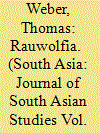

|
|
|
|
|
| Summary/Abstract |
Many recent botanical articles on the medicinal plant Rauwolfia serpentina and on its therapeutic uses inform us that Mahatma Gandhi regularly took it because of its tranquilising effects; some go so far as to suggest that his peacefulness (and even the Indian non-violent struggle against the British colonisers) could be attributed to it. However, there is little evidence to support this. Although Gandhi did occasionally take some drops of an infusion made from the plant for his severe hypertension, the sensational claims that Rauwolfia tea was his favourite daily nightcap demonstrate how the results of poor research, where one unsubstantiated source is copied by others with further exaggerations added, can eventually assume the status of ‘fact’.
|
|
|
|
|
|
|
|
|
|
|
|
|
|
|
|
| 9 |
ID:
162462
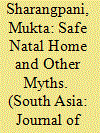

|
|
|
|
|
| Summary/Abstract |
This article focuses on childhood-based sibling violence against adolescent girls in urban India and highlights the ways in which culture shapes, morphs, disguises and elides particular forms of kin-based aggression and presents it as protection, love and routine. It extends the study of familial violence by highlighting women's narratives about violence perpetrated by adolescent brothers or brother-like figures. Contrary to an imagined childhood as a time of benevolent nurturing and care, it reveals that it is in the natal home that the young learn the script of violence and that such forms of aggression help to eventually crystallise their subjectivities. By shifting the issue of violence against women away from the discourse of rights and reframing it within discourses of power, it disturbs traditional definitions of family, victim, survivor, perpetrator and ally, and reveals how women navigate within the shifting contradictions of kinship regimes.
|
|
|
|
|
|
|
|
|
|
|
|
|
|
|
|
| 10 |
ID:
162461
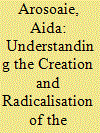

|
|
|
|
|
| Summary/Abstract |
This paper analyses the Students Islamic Movement of India (SIMI) and the Indian Mujahideen (IM) through the lens of social movement theory. By locating these movements in a larger historical and socio-political configuration, the paper documents the national and international political opportunities that fostered SIMI and IM's emergence and radicalisation, including the rise of Hindu extremism, socially institutionalised discrimination and international Islamist revival. Further, the paper investigates the emergence of a seemingly new collective identity and the resources it mobilised. Finally, it investigates the frames employed in justifying calls for violence by deconstructing and contextualising the groups’ Islamic cultural repertoires.
|
|
|
|
|
|
|
|
|
|
|
|
|
|
|
|
| 11 |
ID:
162465
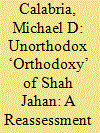

|
|
|
|
|
| Summary/Abstract |
In spite of the many beautiful works of art and architecture produced under the patronage of the Mughal emperor Shah Jahan (r. 1628–58 CE), including the incomparable Taj Mahal, historians have not generally been kind to him. In scholarship both past and present, he is often compared unfavourably with his grandfather, Akbar, and his father, Jahangir, described pejoratively as an ‘orthodox’ Muslim whose reign was characterised by a stricter adherence to shari‘a and religious intolerance of Hindus and Christians. This article re-examines recurrent issues in the historiography of Shah Jahan's life and rule, his religious views and his attitudes towards Hindus, Jains, Christians and Sufis. Based on a diversity of historical and art historical sources, it concludes that the so-called evidence for his ‘orthodoxy’ has been largely misconstrued. This is perhaps due in part to the inflated rhetoric of royal chronicles and colonial critics, as well as to post-Partition prejudice against Islam.
|
|
|
|
|
|
|
|
|
|
|
|
|
|
|
|
|
|
|
|
|